Boost for Iranian cinema at film festivals
- Published
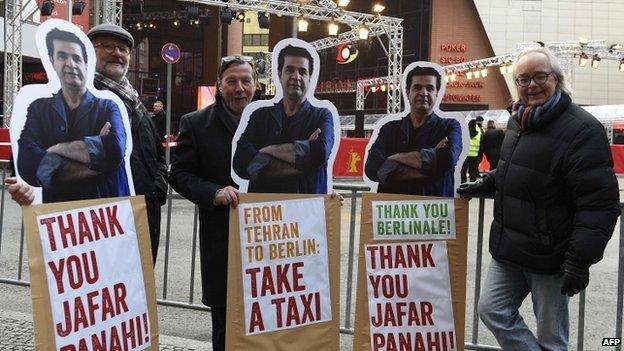
Jafar Panahi was banned from making films in 2010
Iranian cinema is back in the spotlight with a new film by veteran director Jafar Panahi winning top prize at the prestigious Berlin Film Festival.
New films were also shown at the Fajr Film Festival in Tehran this month.
Although the pressures exerted on the film industry under former President Mahmoud Ahmadinejad are slowly beginning to ease, the choice of films on show at the two festivals speaks volumes about the current state of film-making in Iran.
The award-winning Mr Panahi was banned from film-making for 20 years in 2010 after speaking out in favour of opposition protesters following Iran's disputed presidential election.
Despite the restrictions, he's continued working in secret, and although his films cannot be shown in Iran they have been smuggled out to reach audiences abroad.
In his latest feature, Taxi, the director gets behind the wheel of a yellow cab, driving a series of passengers around Tehran and talking about life as he goes.
Shared taxis are a common means of public transport in Iran, and the possibilities they offer for fleeting conversations between random strangers, have long been a feature of Tehran life.
'Intimidation'
In his new film Mr Panahi exploits this opportunity to the full.
His dashboard camera captures passengers from all walks of life speaking their minds about a host of topics - from the death penalty and Shariah law, to a high-profile court case involving a young woman jailed after trying to get into a men's volleyball match.
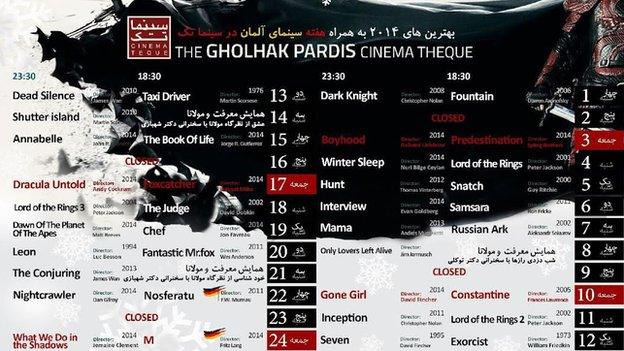
A wide variety of foreign films is on offer at Tehran cinemas, but most are likely to have been edited
One of Mr Panahi's last passengers is Nasrin Sotoudeh, the human rights lawyer and mother of two who was recently freed part way through an 11-year jail sentence .
Ms Sotoudeh has also been banned from practising her profession, and she tells Mr Panahi that the authorities seem intent on intimidating them both.
"They want us to know we're being watched," she says. "They make your best friends your worst enemies."
The film ends without closing credits in order to protect the identity of those involved. Instead, a disclaimer appears on screen, saying that only films which have been authorised by the relevant ministry are allowed to have credits.
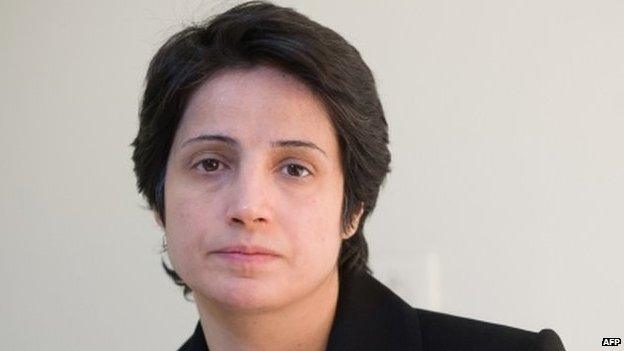
Human rights lawyer Nasrin Sotoudeh, pictured in 2008, was one of the passengers in Taxi
It's a defiant message to the authorities who have also banned Mr Panahi from leaving the country or speaking to the media.
He won't be gracing the red carpet at Berlin this year, even though his new film is in the running for the festival's highest award, the Golden Bear.
But in a statement just before the start of the Berlin festival, he said he would continue making films whatever the cost, because it makes him "feel alive".
"Nothing can prevent me from making films because when I am pushed to the ultimate corners, I connect with my inner self," he wrote.
"And in such private spaces, despite all limitations, the necessity to create becomes even more of an urge."
Hard-hitting themes
Back in Mr Panahi's home town Tehran, the 10-day annual Fajr (Dawn) film festival has just closed.
Held to commemorate the anniversary of the 1979 Islamic Revolution, it's a hugely popular event on the Tehran cultural calendar, showcasing films from both Iranian and international directors.
All the films shown at the festival have to be approved by the censors, and since the revolution there have been strict rules on what can be shown on screen. Actresses must wear hijab and cannot sing or dance. Love scenes and politics are off limits.
Foreign films are also subject to censorship in Iran. A quick look at Tehran film listings for February shows that cinemas are showing many current Hollywood films, including Boyhood, Gone Girl, Interstellar, and even The Interview. But all of them are likely to have been edited for content.
Despite the restrictions Iran has produced some world-class directors over the past 30 years, and many of them have made their debut at the Fajr Festival - including the multi-award winning Abbas Kiarostami, and Asghar Farhadi, who won an Oscar for The Separation in 2012.
This year's programme highlighted some surprisingly hard-hitting themes.
Ice Age (or Asr-e Yakhbandan) by Mostafa Kiayi is a grim tale of drug addiction, and in Confessions of My Dangerous Mind (Eterafat-e Zehn-e Khatarnak-e Man) art-house director Hooman Seyyedi charts the stories of a group of young Tehranis caught up in depression and crime.
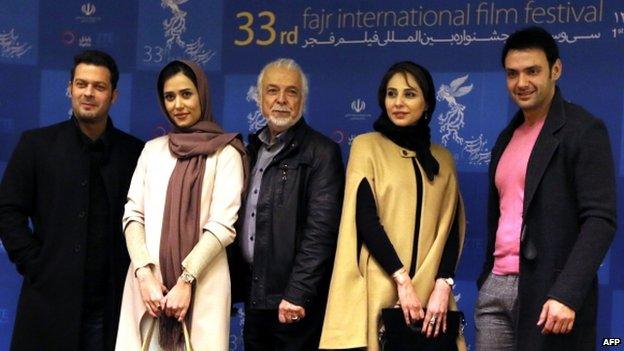
The Fajr festival in Tehran is hugely popular
Another much anticipated film is Shahram Shah-Hosseini's The Girl House (or Khane-ye Dokhtar). With a stellar cast of young actors, the film offers a controversial look at the pressures facing young women in Iran today, touching obliquely on virginity, premarital sex and incest.
One development that's definitely given a boost to Iranian film-making has been the reopening of the House of Cinema, external - the country's main film industry guild.
Shut down for almost two years under former President Ahmadinejad, it was finally allowed to open its doors again in 2013.
Observers say The House of Cinema is helping to improve the quality and openness of Iranian cinema.
But even established directors can have a hard if not impossible time getting films with controversial themes past the censors.
Another Iranian film being shown in Berlin is Atom Heart Mother, by Ali Ahmadzadeh.
It's a darkly farcical story of two young women who are involved in a car crash after a wild party in Tehran.
Mr Ahmadzadeh tried and failed to get it shown at the Fajr film festival this year.
- Published12 September 2013
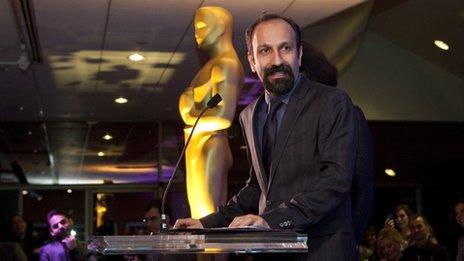
- Published18 September 2013
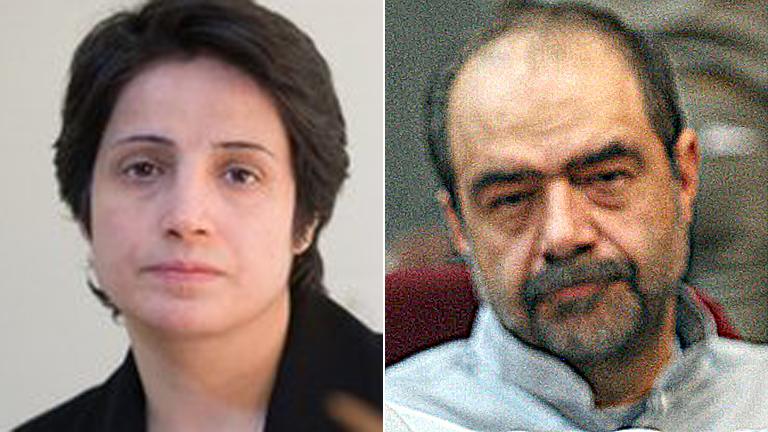
- Published20 December 2010